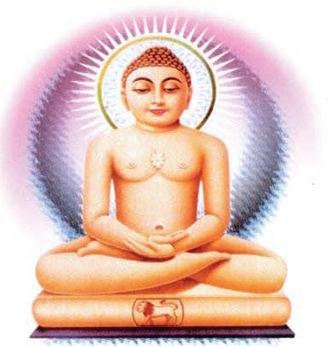
A paper read at a seminar on Jain Philosophy and Epistemology organized by the The B.L. Institute of Indology, Delhi in December 1990.
Introduction
Just like the concept of reality, Jainism has its own theory regarding the existence and nature of soul. What is important to note is the fact that Jainism accepts the existence of soul. It is atmavadi darshana; and the soul, according to Jainism, has an inherent capacity to know all things, if the soul were in its perfection. Higher the degree of purity higher the capacity to know. The main cause of obscured capacity being Karmic obstructions, on the total destruction of all possible karmic veils, pure perception - 'ananta jnana' (infinite knowledge) occurs. "In our empirical lives, the purity of the soul is defiled by the absorption of the unconscious substance, matter. When the opposing energies are completely overthrown, the soul vibrates at its natural rhythm and exercises its function of unlimited knowing. Souls are substances characterized by intelligence, and their differences are due to the degree of their connections with matter." [1] The varieties of perception is nothing but the variation in degree of the karmic obstructions, or purity of Self. Thus like Jain ethics and religion, Jain epistemology is based upon the Jain doctrine of Karma.
Knowledge (jnana) according to Jainas, is the soul's intrinsic, inherent, inseparable and inalienable attribute, without which no soul can exist. Knowledge plays an important part in the conception of soul and its emancipation. Jain epistemology or Jain theory of knowledge thus becomes vital in Jain philosophy. As such Jain epistemology would include the theory of knowledge along with various topics such as psychology; feelings emotions and passions, theory of causation, logic, philosophy of non absolutism and the conditional mode of predication. But I, here in this paper, propose to deal in brief with the types of knowledge in Jain epistemology only.
Theory of knowledge
According to Jainism, the soul, as it is, exists and is consciousness (knowledge). [2] The soul has power of understanding. [3] Consciousness and power of understanding are the most prominent inherent qualities of the soul. [4]
Consciousness (cetana), according to Jainas, is the power of the knowledge, the soul has. It stands for the passive experience of the phenomena, the experience of psychical state leading to pure knowledge. [5] "As conscious, the souls experience in the three following ways. Some experience merely the fruits of karma; some, their own activity; some again, knowledge". [6] The Jaina thinkers and scholars were able to discover that cetana or consciousness culminates in pure and perfect knowledge and knowledge itself has grades and modes. Kunda-Kundacarya observes that "Upyoga or understanding is of two modes, Cognition and Sensation," Nemicandra says, "understanding is divided into two species Viz:- Darsana or sensation and Jnana or Cognition". Uma Svati says "Understanding is the distinguishing characteristic of the soul. It is of two sets (viz. jnana or cognition and darshana or sensation). The first is of eight kinds and the second, of four." [7]
The further description and classification of upyoga or Understanding, as it appears in Jaina scriptures, conclusively proves that the early Jain thinkers clearly grasped the basic is essentially consciousness, cetana or consciousness operates through upyoga or understanding.
The two modes of upyoga are darshana and jnana. "That perception of the generalities (samanya) of things without particularities (visesa) in which there is no grasping of details is called darsana. [8]
Darshana or sensation is of four kinds: -
Darshana is said to consist in the sensation of the generality of objects in which the forms and particulars specification are not recognised. [10] The first two kinds of the four are sensuous and both consists in the consciousness that the eyes and other sense organs are affected.
The last two kinds of sensation, viz. clairvoyant and pure, are of the super-normal type. Out of these two the clairvoyant or avadhi darshana is the sensation of the mysterious parts or aspects of material things, The pure or keval darshana consists in sensing all things of the universe.
The process of understanding becomes more complicated and subtle when it is cognition or jnana.
The Jaina scholars divide cognition or knowledge into two divisions viz. -
The valid knowledge is of five types viz. -
The fallacious knowledge is of three types viz. -
The three fallacious knowledge are the fallacious forms of mati, shruta and avadhi jnana respectively.
Thus, according to Jaina theory of knowledge, cognition is of eight kinds, out of which five kinds are of the valid knowledge and three, of the fallacious knowledge. Since the destruction of karmic veils and the higher degree of purity of the soul is possible through the valid knowledge, the importance lies not in the fallacious species of knowledge but in the valid knowledge. Let us see each of these five species or types of valid knowledge, in brief.
Types of Knowledge:
Cognition or knowledge is of five types: -
Mati jnana or sensuous knowledge is ordinary cognition, obtained by normal functioning of sense perception. It is based on sensuous perception. According to the ancient texts, mati jnana is described as synonymous with intelligence and it includes remembrance, recognition and inductive as well as deductive reasoning. "Mati jnana is sometimes further distinguished into three kinds viz. upalabdhi or perception, bhavana or memory, and upyoga or understanding". [11]
Shruta jnana or authoritative knowledge is knowledge derived through symbols, signs or words. All verbal knowledge is shruta jnana. It includes all canonical, scriptural or both knowledge. "Shruta jnana is of four kinds, namely, labdhi or association, bhavana or attention, upayoga or understanding, and naya or aspects of the meaning of things". [12] Shruta jnana is invariably preceded by mati jnana. As we saw, mati jnana cognises only what is present, the shruta jnana comprehends, all the three time dimensions (past, present and future) relating to the object. "While mati jnana gives us knowledge by acquaintance, this (shruta) gives us knowledge by description.” [13]
Avadhi jnana or clairvoyant is a sort of clairvoyant knowledge or direct visual intuition which enables a person to know things or objects even at a distance of time or space, without their coming into contact with sense organs. Manah paryaya or telephathic knowledge is a direct knowledge of the thoughts of the minds of others. It is without the help of any medium or agency. Just like avadhi jnana, nanah paryaya jnana is an extra sensory perception. Manah paryaya can not be attained by ordinary persons. Only a soul in its higher progression stage or at its higher 'guna-sthana' may acquire this type of knowledge.
Keval jnana or perfect knowledge "comprehends all substances and their modifications." [14] It is the pure, absolute, complete, whole and total knowledge unlimited by space, time or object. It is the very omniscience. Omniscience according to Jainism is possible, it is the highest type of perception which falls in the category of extra-sensory perception. It is the perception of the cognising faculty of self.
Keval jnana is possible only when all the jnana obscuring karmas have been totally annihilated. It is independent of senses, can be only felt and cannot be described. This supreme and unlimited knowledge is possessed only by purified souls free from bondage like Arihants and Siddhas.
Comments
Conclusion:
The Jain epistemology or theory of knowledge, we find it to be quite consistent with its metaphysics, ethics and philosophy of soul. The modes of understanding and the types of knowledge discussed in Jainism fosters a rational outlook and an appropriate attitude in understanding the scope and limitations of soul's capacity to know. The classification and descriptions of knowledge, given by the Jaina scholars, is convincing, minute and highly scientific. It is throughout consistent to the doctrine of karma. Of course, types of knowledge, as discussed in this paper, does not cover the entire realm of Jain epistemology but it certainly paves the preliminary essential background about jnana, jnanin and jneya without which the further complicated topics such as theory of causation, Jaina logic, the philosophy of non- absolutism and the conditional mode of predication cannot be understood.
 Dr. Hemant Shah
Dr. Hemant Shah